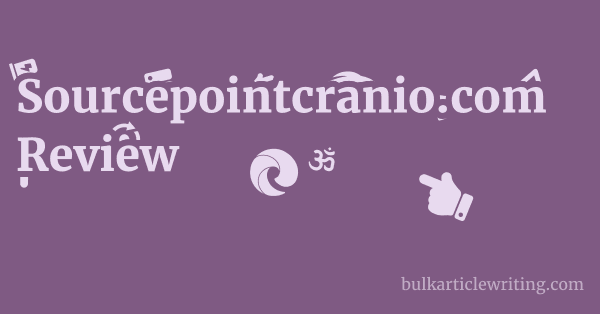For individuals seeking true well-being while adhering to their values, particularly Islamic principles, vigilance and informed decision-making are paramount.
Read more about sourcepointcranio.com:
Sourcepointcranio.com Review & First Look: Unpacking the Claims
Sourcepointcranio.com Features: Examining the Modalities and Claims
Sourcepointcranio.com Cons: Significant Drawbacks and Ethical Concerns
Is Sourcepointcranio.com Legit: Assessing Credibility and Ethical Standing
Sourcepointcranio.com Alternatives: Permissible Paths to Well-being
Is Sourcepointcranio.com a Scam: Analyzing Red Flags and Unproven Claims
Verifying Credentials and Licensing
The first line of defense against dubious wellness practices is to meticulously verify the practitioner’s credentials and licensing.
Any legitimate professional in a health or therapeutic field will have verifiable qualifications from accredited institutions and current licenses from relevant regulatory bodies.
- Seek Licensed Professionals: Always prioritize practitioners who are licensed in their respective fields (e.g., licensed medical doctor, registered physical therapist, board-certified psychologist, licensed massage therapist). Licenses indicate that the individual has met educational standards and passed examinations.
- Check Regulatory Boards: In the U.S., most professions have state or national licensing boards. You can typically search these databases online to confirm a practitioner’s license status, disciplinary actions, and educational background.
- Beware of Vague Titles: Be wary of titles like “healer,” “energy worker,” “master practitioner,” or “guru” if they are not accompanied by specific, verifiable professional licenses for the services being offered. These titles often lack regulatory oversight.
- Data Point: The National Council of State Boards of Nursing (NCSBN) provides a public directory to verify nursing licenses across states, demonstrating the standard for professional transparency. Similar boards exist for other health professions.
Demanding Evidence-Based Practices
Legitimate health and wellness services are built on scientific evidence.
|
0.0 out of 5 stars (based on 0 reviews)
There are no reviews yet. Be the first one to write one. |
Amazon.com:
Check Amazon for How to Avoid Latest Discussions & Reviews: |
If a practice cannot demonstrate efficacy through robust research, it should be approached with skepticism.
- Ask for Research: Inquire about the scientific studies, clinical trials, or peer-reviewed research that supports the claims being made. A credible practitioner should be able to provide this information or refer you to reliable sources.
- Distinguish Anecdotal from Empirical: Understand that testimonials, while heartwarming, are anecdotal evidence. They are personal stories and do not equate to scientific proof. A service relying solely on testimonials for its effectiveness is a red flag.
- Consult Reputable Sources: Cross-reference claims with information from established medical institutions (e.g., Mayo Clinic, National Institutes of Health), reputable psychological associations (e.g., American Psychological Association), and academic journals.
- Data Point: A 2018 study in Annals of Internal Medicine found that many complementary health approaches lack rigorous evidence of efficacy, urging caution for both practitioners and consumers.
Understanding the Financial Aspect
Financial transparency and reasonable pricing are indicators of an ethical practice. Loftcoaty.com Review & First Look
Be wary of practices that pressure you into expensive, long-term commitments for unproven treatments.
- Clear Pricing: Ensure all fees are clearly stated upfront, including any additional costs for notes, packages, or add-ons. Avoid services with deliberately opaque pricing.
- No High-Pressure Sales: Be cautious of practitioners who employ high-pressure sales tactics, insist on multiple expensive sessions without clear justification, or make you feel guilty for not committing to a long-term plan.
- Beware of “Miracle Cures”: Services promising immediate, miraculous, or all-encompassing cures for complex, chronic conditions are often scams. True healing and recovery are often a process.
- Data Point: The Better Business Bureau (BBB) frequently issues warnings about businesses that use deceptive pricing or misleading claims, encouraging consumers to report such practices.
Adhering to Islamic Principles
For Muslims, an essential filter for any wellness practice is its alignment with Islamic teachings.
This requires knowledge and vigilance against practices that could lead to Shirk or rely on forbidden means.
- Tawhid (Oneness of Allah): Ensure the practice does not attribute healing power to anything other than Allah SWT. While we use means, the ultimate power and cure come from Him.
- Avoid Shirk and Superstition: Steer clear of practices involving “energy healing” (unless it’s purely metaphorical for physiological processes, not spiritual forces), “chakra balancing,” “past life regression,” fortune-telling, astrology, amulets, or reliance on Jinn/spirits outside of permissible Ruqyah.
- Modesty and Gender Interaction: For practices involving physical touch, ensure modesty (Awrah) is preserved and, where possible, interaction is with a practitioner of the same gender to avoid impermissible mingling.
- Reliance on Allah (Tawakkul): Remember that while seeking treatment is encouraged, true reliance is on Allah. Supplication (Du’a) and gratitude are powerful components of healing.
- Data Point: Islamic scholars and fatwa councils (e.g., IslamQA, Council of Senior Scholars) consistently warn against practices that involve magic, fortune-telling, or Shirk, emphasizing the importance of seeking lawful and pure means of healing.
By applying these rigorous checks, you can protect yourself from potentially harmful or financially exploitative wellness practices and instead choose pathways that genuinely contribute to your well-being in a permissible and effective manner.
Is Sourcepointcranio.com a Scam: Analyzing Red Flags and Unproven Claims

Leave a Reply